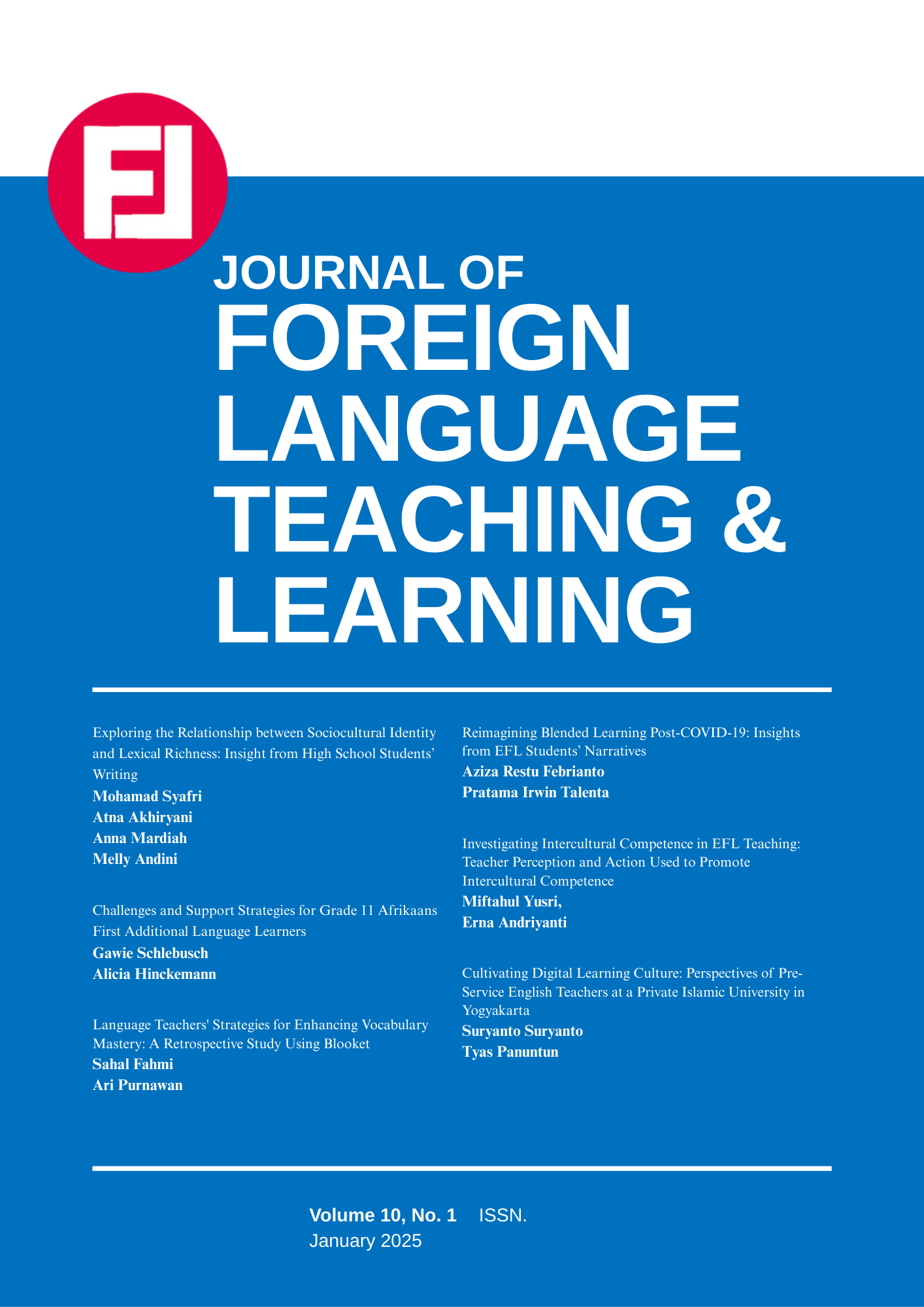Language Teachers' Strategies for Enhancing Vocabulary Mastery: A Retrospective Study Using Blooket
DOI:
https://doi.org/10.18196/ftl.v10i1.25455Keywords:
Blooket in Education, Gamification, Language Teacher, Language Teaching Strategies, Vocabulary MasteryAbstract
Background: Foreign language instruction in Indonesia remains teacher-centered with minimal technology use. Digital tools like Blooket now offer educators opportunities to boost student engagement and vocabulary acquisition through gamification.
Objective: This study examines the impact of language teachers in improving students' vocabulary mastery through Blooket.
Methods: A retrospective qualitative approach was employed, focusing on 15 language teachers at SMA Negeri 1 Imogiri. The research highlights the effectiveness of gamification strategies in vocabulary instruction. The researcher employed a case study methodology, utilizing qualitative research techniques and questionnaire design for this study. In this study, 15 participants, who were language teachers with a minimum of five years of teaching experience in English and German at SMA Negeri 1 Imogiri, were specifically asked questions about vocabulary instruction.
Findings: Findings indicate that a combination of gamified learning and varied teaching methods significantly enhances students' vocabulary acquisition. Students will acquire new words more successfully if the teacher integrates interactive and contextualized learning experiences, such as game-based learning, real-world applications, and multimodal instruction.
Conclusion: This study contributes to the existing literature by emphasizing the role of teachers in integrating gamification to foster vocabulary mastery.
References
Afzal, N. (2019). A study on vocabulary-learning problems encountered by BA English majors at the university level of education. Arab World English Journal, 10(3), 81–98. https://doi.org/10.24093/Awej/vol10no3.6
Altun, M., & Yassin, K. A. (2022). The impact of using gamification in teaching and learning English. International Journal of Social Sciences & Educational Studies, 9(2). Https://Doi.Org/10.23918/Ijsses.V9i2p291
Ambarwati, R., & Mandasari, B. (2020). The influence of online Cambridge dictionary on students’ pronunciation and vocabulary mastery. Journal Of English Language Teaching And Learning (Jeltl) 1, (2). Http://Jim.Teknokrat.Ac.Id/Index.Php/English-Language-Teaching/Index
Anisa, K. D., Marmanto, S., & Supriyadi, S. (2020). The effect of gamification on students’ motivation in learning English. Leksika: Jurnal Bahasa, Sastra dan Pengajarannya, 14(1), 22-28.Https://Jurnalnasional.Ump.Ac.Id/Index.Php/Leksika/Article/View/5695
Armanda, M. L., & Indriani, L. (2022). Is learning English boring with gamification? ELTR Journal, 6(1). Https://Doi.Org/10.37147/Eltr.V6i1.129
Armelia, N., Sudarmarji, I., Nuraini, H., Forsia, L., & Nirmala, N. (2024). Improving students’ english vocabulary mastery through the learning media" card games". Jurnal Basicedu, 8(1), 233-241. https://doi.org/10.31004/basicedu.v8i1.6898
Azahra, N. H. N., Isnaini, S., Sudarmaji, I., Nuraini, H., Forsia, L., & Nirmala, N. (2024). Implementing the use of flashcards to improve students’ vocabulary mastery; classroom action research. Jurnal Basicedu, 8(1), 225-232. https://doi.org/10.31004/basicedu.v8i1.6896
Bayaksud, N., Degeng, P. D. D., & Razali, K. A. (2024). The use of Quizlet for vocabulary learning: A lesson from innovative application. Journal of Language and Literature Studies, 4(1), 244-255. https://doi.org/10.36312/jolls.v4i1.1823
Bratel, O., Kostiuk, M., Okhrimenko, I., & Nanivska, L. (2023). Student-centered online assessment in foreign language classes. World Journal of English Language, 13(1), 185–194. Https://Doi.Org/10.5430/Wjel.V13n1p185
Elmahdi, O. E. H., & Hezam, A. M. M. (2020). Challenges for methods of teaching English vocabulary to non-native students. Advances In Social Sciences Research Journal, 7(5), 556–575. Https://Doi.Org/10.14738/Assrj.75.8263
Evelyn, H., & Brown, C. (1995). Vocabulary, semantics, and language education. Studies In Second Language Acquisition, 19(1), 125–126. Https://Doi.Org/10.1017/S027226319727107x
Hadijah, H., Pratolo, B. W., & Rondiyah, R. (2020). Interactive game “Kahoot!” as the media of students’ vocabulary assessment. Journal on English as a Foreign Language, 10(1), 87–105. Https://Doi.Org/10.23971/Jefl.V10i1.1670
Kovalenko, Y. (2024). Effective techniques for developing advanced vocabulary skills in English language. Teaching Languages at Higher Educational Establishments at the Present Stage. Intersubject Relations, (44), 60-76. https://doi.org/10.26565/2073-4379-2024-44-04
Mahendra, J. W., Maghfiroh, A., Harmanto, B., & Hatmoko, D. (2024). The effectiveness of scrabble games to promote vocabulary achievement of migrant workers’ children in Malaysia. Journal of Languages and Language Teaching, 12(2), 963-973. https://doi.org/10.33394/jollt.v12i2.10478
May, A. (2021). Gamification, game-based learning, and student engagement in education. Https://Openriver.Winona.Edu/Leadershipeducationcapstones/55
Nation, I. S. P. (2001). Learning vocabulary in another language. Cambridge University Press. Https://Www.Cambridge.Org/Core/Books/Abs/Learning-Vocabulary-In-Another-Language/Cambridge-Applied-Linguistics-Series/835a160179ea87dd3f6e6cbfa9cea08d
Ningsih, I. S. T., & Zuhriyah, M. (2024). The effectiveness of using fly swatter game to teach vocabulary. J-Shelves of Indragiri (JSI), 6(1), 1-14. https://doi.org/10.61672/jsi.v6i1.2728
Oktaria, A. A., Rohmayadevi, L., & Murwantono, D. (2021). Online game quiz “Kahoot” in teaching English for students of SMP Muhammadiyah Yogyakarta. 4(2). Https://Scholar.Archive.Org/Work/Tux2jm4s2ff6zctdhuu7lyrd3y/Access/Wayback/Https://Journal.Ikipsiliwangi.Ac.Id/Index.Php/Project/Article/Download/6592/Pdf
Okyar, H. (2021). Vocabulary learning strategies of Turkish EFL learners: A focus on gender. Jet (Journal of English Teaching), 7(1), 43–54. Https://Doi.Org/10.33541/Jet.V7i1.2289
Omar, U., & Yaacob, A. (2021). Exploring types of vocabulary learning strategies used by TESL teacher trainees at The Institute of Teachers Education. South Asian Journal of Social Sciences and Humanities, 2(4), 102-116. https://doi.org/10.48165/sajssh.2021.2407
Pedersen, L. I. (2022). Education for teaching 1-7 how can digital games be used as a resource for adaptive teaching in English? (Master's thesis, Inland Norway University). https://Brage.Inn.No/Inn-Xmlui/Handle/11250/3019776
Prabawati, A., Am, S. A., & Am, S. A. (2021). The students’ perception of the online media used by teacher in learning English. English Language Teaching Methodology, 1(3), 169–181. Https://Doi.Org/10.22219/Jpbi.Vxiy.Xxyy
Przybyłek, A., Albecka, M., Springer, O., & Kowalski, W. (2022). Game-based Sprint retrospectives: Multiple action research. Empirical Software Engineering, 27(1). https://doi.org/10.1007/s10664-021-10043-z
Rajabov, M. (2024). How to teach vocabulary in pre-school and school. In Conference Proceedings: Fostering Your Research Spirit (pp. 31-33). https://doi.org/10.2024/5fxghn47
Romrome, A. Y. (2024). Scrutinizing papuan EFL students’strategies for enriching English vocabulary mastery. UC Journal: ELT, Linguistics and Literature Journal, 5(1), 54-63. https://doi.org/10.24071/uc.v5i1.8735
Siagian, B., & Purwanto, M. B. (2024). Lextutor English learning pronunciation and vocabulary: A language data base program. PUSTAKA: Jurnal Bahasa Dan Pendidikan, 4(1), 116-130. https://doi.org/10.56910/pustaka.v4i1.1062
Sibuea, E. R., Siregar, P., & Sembiring, J. (2024). The impact of lyrical poetry on student vocabulary acquisition. ETANIC Journal Of English Language Teaching And Applied Linguistics, 2(1), 56-64. https://doi.org/10.55266/journaletanic.v2i1.372
Suardi, S., & Sakti, J. E. (2019). Teacher difficulties in teaching vocabulary. IDEAS: Journal on English Language Teaching and Learning, Linguistics and Literature, 7(2). https://doi.org/10.24256/ideas.v7i2.1026
Susilo, P. M., Theresia, T., Nathania, C., & Merrino, R. (2022). Using Blooket to improve Chinese vocabulary study for 11 th grade students in high school. 4(1), 501–506. Http://Iccd.Asia/Ojs/Index.Php/Iccd/Article/View/512
Suwastini, N. K. A., & Rahmayanti, P. (2024). Prospective EFL teachers’ perception toward teaching English vocabulary through poetry. JEES (Journal of English Teachers Society), 9(1), 1-11. https://doi.org/10.21070/jees.v9i1.1769
Taslim, T., Asrifan, A., Chen, Y., Nurdania, N. R. (2019). Correlation between student’s vocabulary mastery and speaking skill. Journal of Advanced English Studies, 2(2). Http://Sastra.Unifa.Ac.Id/Journal/Index.Php/Jes/Index
Thu, T. T. M., & Dan, T. C. (2023). Students’ perceptions on English vocabulary teaching and learning by using Blooket: A case study. European Journal Of Applied Linguistics Studies, 6(1). Https://Doi.Org/10.46827/Ejals.V6i1.321
Trinh, T. H., Nguyen, M. N., & Tran, T. T. H. (2022). Teachers and students’ perceptions of using digital games in improving vocabulary at Non-English-Majored class. Asiacall Online Journal, 13(5), 112–131. Https://Doi.Org/10.54855/Acoj.221358
Wandari, T., Unsiah, F., & Sahar, R. (2024). Utilizing wordwall.net on the improvement of students’ vocabulary mastery: An ICT-based lesson. Journal of Languages and Language Teaching, 12(2), 952-962. https://doi.org/10.33394/jollt.v12i2.10754
Wang, X., & Reynolds, B. L. (2024). Beyond the books: Exploring factors shaping Chinese English learners’ engagement with large language models for vocabulary learning. Education Sciences, 14(5), 496. https://doi.org/10.3390/educsci14050496
Wongsaming, A., Yonwilad, W., & Tongmual, N. (2023). The effectiveness of cooperative learning management using the TGT technique and Blooket applications towards problem-solving abilities of seventh grade students. Journal of Green Learning, 3(1), 17-26. https://doi.org/10.53889/jgl.v3i1.193
Xiangze, Z., & Abdullah, Z. (2023). Station rotation with gamification approach to increase students’ engagement in learning English online. Arab World English Journal, 9, 105–121. Https://Doi.Org/10.24093/Awej/Call9.7
Yudha, H. T., & Mandasari, B. (2021). The analysis of game usage for senior high school students to improve their vocabulary mastery. Journal of English Language Teaching and Learning (Jeltl), 2(2). Http://Jim.Teknokrat.Ac.Id/Index.Php/English-Language-Teaching/Index
Downloads
Published
How to Cite
Issue
Section
License
Copyright (c) 2025 Sahal Fahmi, Ari Purnawan

This work is licensed under a Creative Commons Attribution-ShareAlike 4.0 International License.
Copyright
Authors retain copyright and grant the journal right of first publication with the work simultaneously licensed under a Creative Commons Attribution-ShareAlike 4.0 International License that allows others to share the work with an acknowledgment of initial publication in this journal.
Authors are permitted and encouraged to post their work online (e.g., in institutional repositories, social media account, or on their website) after the article getting published in the journal, as it can lead to productive exchanges and earlier and greater citation of published work (See The Effect of Open Access).License
You are free to:
- Share — copy and redistribute the material in any medium or format
- Adapt — remix, transform, and build upon the material for any purpose, even commercially.
Attribution — You must give appropriate credit, provide a link to the license, and indicate if changes were made. You may do so in any reasonable manner, but not in any way that suggests the licensor endorses you or your use.
ShareAlike — If you remix, transform, or build upon the material, you must distribute your contributions under the same license as the original.
- No additional restrictions — You may not apply legal terms or technological measures that legally restrict others from doing anything the license permits.



.png)





